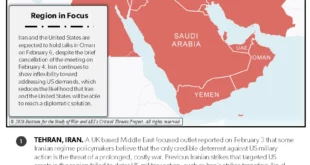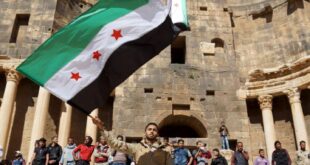 “Israel is determined to continue on in the fight against Hezbollah,” Olmert said. “We will not hesitate to take severe measures against those who are aiming thousands of rockets and missiles against innocent civilians for the sole purpose of killing them.”
“Israel is determined to continue on in the fight against Hezbollah,” Olmert said. “We will not hesitate to take severe measures against those who are aiming thousands of rockets and missiles against innocent civilians for the sole purpose of killing them.”
Israeli forces have been fighting Hezbollah for two weeks, seeking to neutralize the group responsible for repeated rocket attacks against towns in northern Israel.
The combat has left more than 400 people dead on both sides of the Lebanese-Israeli border.
Despite many calls for an immediate cease-fire, Rice on Tuesday reiterated the U.S. stance that conditions must be right for such a declaration.
Any cease-fire that “returns us to the status quo” will be a false promise, Rice has said. Hezbollah is the source of the problem, she has said, and must be disarmed.
“The international community has hard work ahead of it,” according to Rice, who said it is important to “begin to really lay the groundwork for an enduring peace in this region.”
Rice’s visit to Jerusalem comes after a dramatic stop Monday in Beirut, where she met with Lebanese Prime Minister Fouad Siniora and Nabih Berri, Lebanon’s parliament speaker, who has close ties with Hezbollah and Syria.
“I am obviously here because we are deeply concerned about the Lebanese people and what they are enduring,” Rice said in the Lebanon capital. “We are talking about the humanitarian situation, and we are also talking about a durable way to end the violence.
“President Bush wanted this to be my first stop — here in Lebanon — to express our desire to urgently find conditions in which we can end the violence and make life better for the Lebanese people.” After the closed-door meeting, a source in Berri’s office told CNN that Berri considered Rice’s comments “not encouraging” because of her insistence on a simultaneous implementation of conditions.
By that, the source said, Berri meant Rice had wanted any cease-fire agreements, deployment of international troops, disarming of Hezbollah, return of displaced Lebanese and plans for reconstruction to occur at the same time.
Berri considered such a course impractical and believed that a cease-fire should come first, the source said. Only afterward should the Lebanese government discuss other issues, such as the two Israeli soldiers whose capture by Hezbollah on July 12 sparked the crisis.
In addition, Berri was surprised Rice did not mention either the Israeli soldiers or the possibility of a prisoner swap between Israel and Hezbollah, the source said.
A senior U.S. State Department official in Washington said no detailed plans yet exist.
Lebanese Minister of Social Affairs Nayla Muawwad said the discussion wound up serving more to inform Rice than for her to inform the other participants.
As Rice met with Siniora, dozens of demonstrators outside his office building protested U.S. support for the military action.
“4 Million Lebanese Hostages,” said one poster. Another blared: “Massacre.” Yet another: “1,000 Injured — American Tax Dollars at Work.”
Israeli Foreign Minister Tzipi Livni said Monday: “There is no conflict between Israel and the people of Lebanon. But Israel has no higher responsibility than to defend its citizens.”
Livni called for the release of the abducted Israeli soldiers and for Lebanon to exercise sovereignty over its territory by carrying out U.N. Resolution 1559, which calls for the disarmament of militias.
She also called on the international community “to assist the Lebanese government in confronting the Hezbollah.”
Meanwhile, the Lebanon-based Hezbollah guerrillas traded more attacks with Israeli forces Tuesday. While in the Mideast, Rice also is expected to meet with Palestinian Authority President Mahmoud Abbas in Ramallah.
Cease-fire not expected immediately
U.S. officials told CNN’s John King privately not to expect a cease-fire to come out of Rice’s mission.
She does plan to meet with Hezbollah or with Syrian leaders during her trip.
Although Syria is thought to hold much influence with Hezbollah, the Bush administration has argued that direct talks with Syria would be pointless.
Rice was planning to head to Rome, Italy, later this week to meet with Arab leaders and U.N. Secretary-General Kofi Annan. On the agenda will be the possibility of a multinational force for southern Lebanon.
U.N. appeals for Lebanese aid
Meanwhile, the U.N.’s relief coordinator, Jan Egeland, launched an appeal for $150 million to help an estimated 800,000 Lebanese displaced by the conflict.
Within hours, the United States announced it had pledged $30 million to the fund.
Beginning Tuesday, the U.S. military said, it would assist with the shipping of humanitarian supplies to the Port of Beirut for distribution by non-governmental organizations.
But Egeland said Monday his team does not have safe access to those trapped in the south of Lebanon and that the bombing had rendered many roads impassable.
In an interview with CNN from Beirut, he appealed for a cease-fire. “Too many civilians are suffering, both in northern Israel and here in Lebanon,” he said.
U.N. Secretary-General Kofi Annan said Friday that he feared a “major humanitarian disaster” if the conflict did not end soon.
Blair: It’s a ‘catastrophe’
In London, Prime Minister Tony Blair said officials “have been working very hard to put in place a plan that would allow … the immediate cessation of hostilities.”
“Of course, we all want to see this on both sides. It’s important that it happen. It’s important that it happen because what is occurring at the present time in Lebanon is a catastrophe. It is damaging that country and its fragile democracy. But it is also important that we deal with the reasons that this conflict has come about.”
 Eurasia Press & News
Eurasia Press & News



